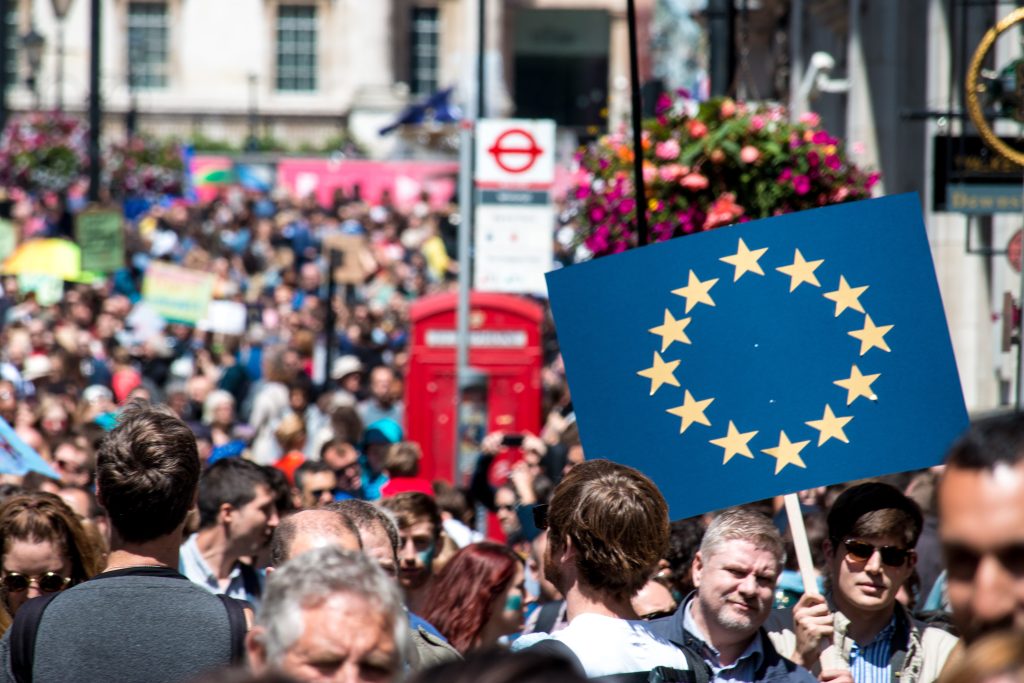‘Are you British or European?’, ‘You are paying too much for your weekly shopping’, ‘More Jobs. Lower Prices. Your family is better off with Britain in Europe’, ‘Your household could be £933 per year better off if the UK left the European Union’…—those are only some examples of the messages included on the leaflets and posters produced ahead of the Brexit referendum, in which the United Kingdom voted to leave the European Union (with 51.9% of voters supporting ‘Leave’). Those highly emotional headings provide an overview of one of the most significant political events in contemporary British history, illustrating how intense affects and distorted communication have been at the forefront of the ‘Remain’ and ‘Leave’ campaigns.

In post-Brexit Britain, literature has proved to be a powerful force in steering conversation about changes in the UK’s political and social realm, as it not only discusses how it feels to live in the divided society, but also envisions the country’s future, and acknowledges the existence of the ‘other’. Focusing on an emotional and cultural shift in pre- and post-2016 Britain, in my research, I elaborate on the affective aspect of contemporary fiction, in particular Brexit literature, or to use Kristian Shaw’s (2018, 2021) term ‘Brexlit’, which boomed in 2016 and has been a growing genre ever since (Veličković, 2020). However, my research does not focus solely on Brexlit; instead, it originates from the claim that Brexit affects—postcolonial melancholia, nostalgia, anger, fear, anxiety, and hope—were already present in British literary imagination even before the EU referendum.
I group Brexit affects in, what I call, affective strands: bands of associated affects that relate to each other but do not necessarily create a cohesive atmosphere. I distinguish four affective strands distinctive to contemporary British fiction: ‘amassing loss’, ‘carnival of anger’, ‘feanxiety’, and ‘union of hope’. I assign particular affects to the strands because of their similar affective connotation/direction, or because they constitute the reaction to an event or a certain state. I approach the concept of affective strands also from the formal perspective, arguing that they do not rely solely on the content of the emotions (and the fiction) but also operate as a form itself.
For instance: I scrutinise ‘amassing loss’, an affective strand encompassing despair, nostalgia, and postcolonial melancholia. Arguing that the Brexit vote was carried on a wave of loss—both actual and imagined— I demonstrate how, in the post-1945 moment, the collective senses of loss (affective, material, political) were amassing in the British nation, leading to the development of the negative emotions and affects, such as despair and melancholy. I approach loss not only as a mental/psychological phenomenon but also as a material one, pointing to the deindustrialisation and dismantling of local communities, as one of the reasons behind the Brexit vote. My research does not, however, hinge solely on the socio-political aspect of amassing loss but also examines its literary embodiment: analysing Jonathan Coe’s novels The Rotters’ Club (2001) and Middle England (2018) for example, I demonstrate how the novels respond to but also formally create a sense of amassing loss through fragmentation of the narrative and linguistic accumulation.
My theoretical framework is indebted to the works on cultural politics of emotions by Sara Ahmed (2004, 2010), Sianne Ngai (2005), and Lauren Berlant (2011), affective-formalist methodology and works by Eugenie Brinkema (2014), Caroline Levine (2015), and Alexandra Kingston-Reese (2020), but also by the findings of the Affective Societies research centre, in particular, works of Jan Slaby and Christian von Scheve (2019), whose definitions of relational affect and emotion constitute the basis of my understanding of the notions central to affect studies. Research conducted by Affective Societies—including works by Antje Kahl, Anne Fleig, Friedlind Riedel, Rainer Muhlhoff—also informs my discussion on the importance of emotions in the context of social cohesion and societal transformations. The intersection of our research projects proves that Brexit, sometimes interpreted as a mood in its own rights, may be understood not only as a singular political case but also as an emotional event, symptomatic of the socio-political character of modern affective societies.
References:
Ahmed, Sara. The Cultural Politics of Emotion. Edinburgh: Edinburgh University Press, 2004.
Ahmed, Sara. The Promise of Happiness. Durham: Duke University Press, 2010.
Berlant, Lauren. Cruel Optimism. Durham: Duke University Press, 2011.
Brinkema, Eugene. The Forms of the Affects. Durham: Duke University Press, 2014.
Kingston-Reese, Alexandra. Contemporary Novelists and the Aesthetics of Twenty-First Century American Life. Chicago: University of Iowa Press, 2020.
Levine, Caroline. Forms: Whole, Rhythm, Hierarchy, Network. Princeton: Princeton University Press, 2015.
Ngai, Sianne. Ugly Feelings. Cambridge: Harvard University Press, 2005.
Shaw, Kristian. Brexlit: British Literature and the European Project. London: Bloomsbury Publishing Plc, 2021.
Slaby, Jan, and Christian von Scheve, eds. Affective Societies. Key Concepts. London: Routledge, 2019.
The Electoral Commission. The 2016 EU referendum: Report on the 23 June 2016 referendum on the UK’s membership of the European Union. September 2016. https://www.electoralcommission.org.uk/sites/default/files/pdf_file/2016-EU-referendum-report.pdf.
Walker, Nigel. “Brexit timeline: events leading to the UK’s exit from the European Union. Briefing Paper 7960.” House of Commons Library. January 6, 2021. https://commonslibrary.parliament.uk/research-briefings/cbp-7960/.




